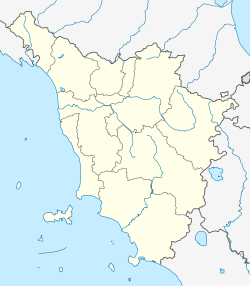Vinci, Tuscany
Vinci | |
|---|---|
| Comune di Vinci | |
 Panorama of Vinci | |
| Coordinates: 43°47′N 10°55′E / 43.783°N 10.917°E | |
| Country | Italy |
| Region | Tuscany |
| Metropolitan city | Florence (FI) |
| Frazioni | Anchiano, Apparita, Badia a Passignano, Burrino, Collegonzi, Faltognano, La Stella, Mercatale, Orbignano, Petroio, Piccaratico, Salvino, San Donato, San Pantaleo, Santa Lucia, Sant'Amato, Sant'Ansano, Sovigliana, Spicchio, Toiano, Vitolini |
| Government | |
| • Mayor | Giuseppe Torchia |
| Area | |
| • Total | 54 km2 (21 sq mi) |
| Elevation | 97 m (318 ft) |
| Population (30 November 2016)[2] | |
| • Total | 14,579 |
| • Density | 270/km2 (700/sq mi) |
| Demonym | Vinciani |
| Time zone | UTC+1 (CET) |
| • Summer (DST) | UTC+2 (CEST) |
| Postal code | 50059 |
| Dialing code | 0571 |
| ISTAT code | 048050 |
| Patron saint | St. Andrew |
| Website | Official website |
Vinci (English: /ˈvɪntʃi/ VIN-chee, Italian: [ˈvintʃi])[3] is a comune of the Metropolitan City of Florence in the Italian region of Tuscany.[4] The birthplace of Renaissance polymath Leonardo da Vinci lies just outside the town.
Main sights[edit]
- Museo Leonardiano, museum of Leonardo da Vinci. This museum has displays of some of the inventions that are drawn in Leonardo's notebooks.
- Casa Natale di Leonardo, the birthplace of Leonardo da Vinci, situated approximately 3 km to the northeast of Vinci in the frazione of Anchiano.[5] There are some reproductions of his drawings at the house.
- Church of Santa Croce, built in the 13th century but later remade in neo-Renaissance style.
Twin towns[edit]
Vinci has two official sister cities as designated by Sister Cities International:
Wikimedia Commons has media related to Vinci.
References[edit]
- ^ "Superficie di Comuni Province e Regioni italiane al 9 ottobre 2011". Italian National Institute of Statistics. Retrieved 16 March 2019.
- ^ "Popolazione Residente al 1° Gennaio 2018". Italian National Institute of Statistics. Retrieved 16 March 2019.
- ^ Wells, John (3 April 2008). Longman Pronunciation Dictionary (3rd ed.). Pearson Longman. ISBN 978-1-4058-8118-0.
- ^ "Comune di Vinci" (in Italian).
- ^ "The origin of the genius". Archived from the original on 12 July 2012. Retrieved 4 May 2019.
- ^ "Gemellaggi" (in Italian). Archived from the original on 23 September 2015. Retrieved 11 June 2013.
External links[edit]





